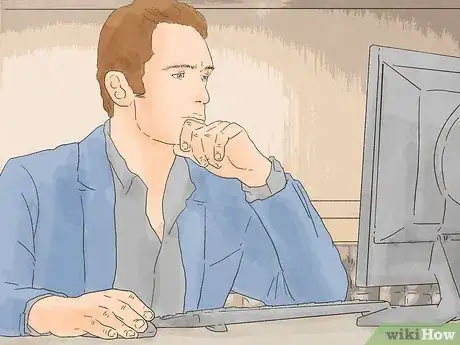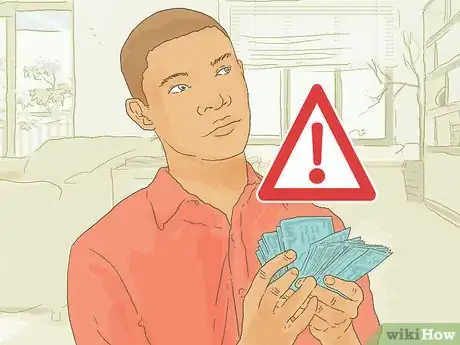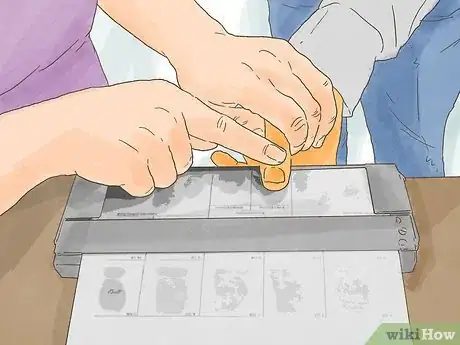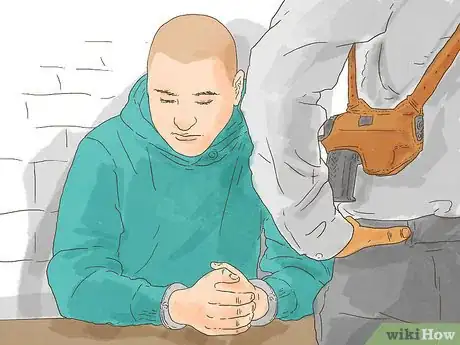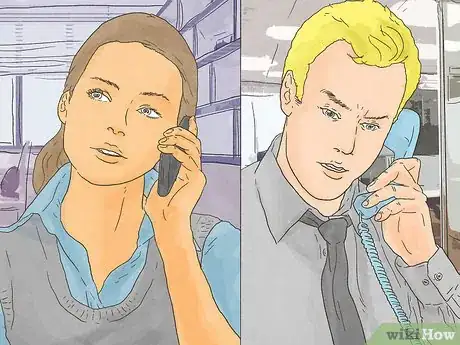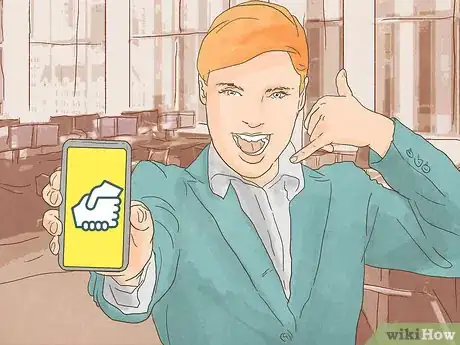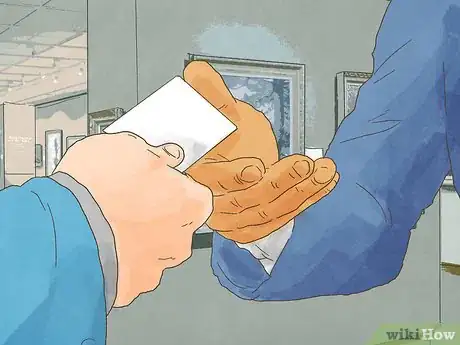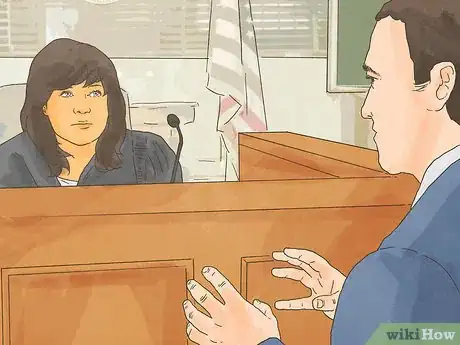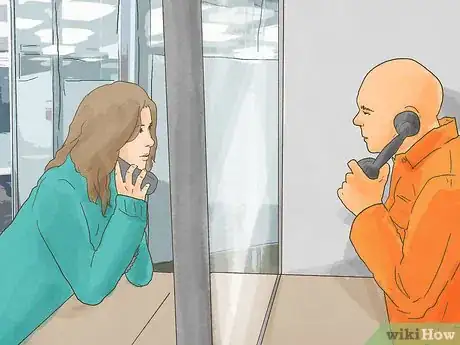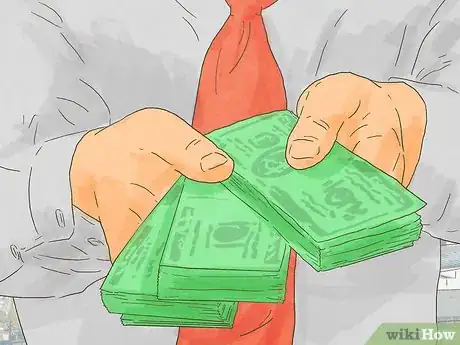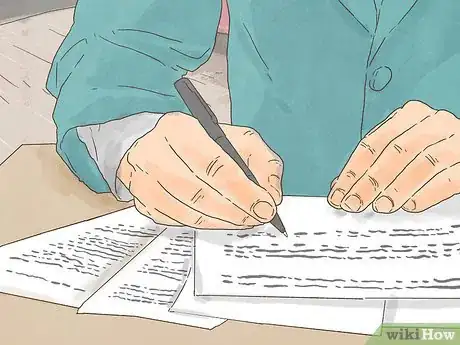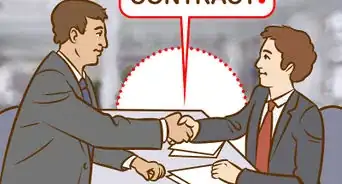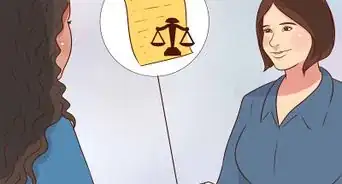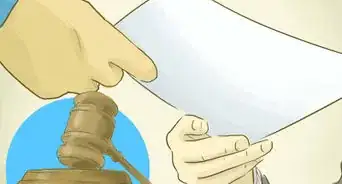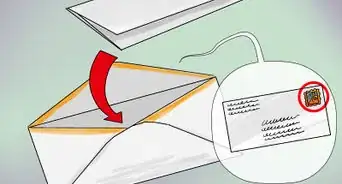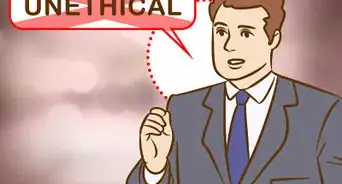This article was co-authored by Clinton M. Sandvick, JD, PhD. Clinton M. Sandvick worked as a civil litigator in California for over 7 years. He received his JD from the University of Wisconsin-Madison in 1998 and his PhD in American History from the University of Oregon in 2013.
There are 13 references cited in this article, which can be found at the bottom of the page.
This article has been viewed 37,206 times.
Hiring an attorney after being arrested is the single most important thing you can do. A qualified criminal defense attorney will help you arrange bail, advise you about your case, and start building your defense. Generally, if you face the possibility of time in jail for your conviction, then you have the right to an attorney. You should call an attorney from jail or request a public defender when you appear before the judge.
Steps
Assessing Your Legal Needs
-
1Figure out if you need a criminal defense lawyer. If you have been arrested for allegedly committing a crime, you need to contact an attorney as soon as possible. Whether you were arrested for a minor criminal violation (e.g., state law possession of marijuana) or a serious felony (e.g., federal terrorism charges), a lawyer will help you negotiate with prosecutors, represent you in court, and ensure you receive a fair trial. Even if you do not end up hiring an attorney to represent you, they can still help you understand the charges against you.
-
2Look for specialists. Some criminal defense attorneys specialize in certain areas of the law. Depending on what you have been charged with, you may be able to find an attorney who works solely on your type of case. This specialization can be an incredible advantage for you as these attorneys will have a wealth of experience dealing with the particulars of your type of case. To find a specialist you can look through attorney websites and other resources. Additionally, some states offer specialization designations for attorneys who show competence in a particular area of the law.
- For example, some attorneys solely handle white collar crime (e.g., financial crimes, fraud). Other attorneys solely handle death penalty cases.[1]
Advertisement -
3Identify whether you are in state or federal court. Attorneys are only allowed to represent clients in certain areas and in certain court systems. For example, an attorney licensed solely in California would not usually be able to represent someone in an Illinois state case. Additionally, lawyers cannot practice in federal court unless they have been admitted to practice there. Therefore, if you have been charged with a federal crime, you will need to hire a lawyer who specializes in federal criminal defense. These attorneys will be properly licensed and will have experience with federal rules and procedures.[2]
- To determine whether you are being charged with a state or federal crime, ask for clarification. Additionally, if you have paperwork with information about your charges on it, look at that. If the legal citation is to the United States Code (e.g., U.S.C.), you are being charged with a federal crime. On the other hand, if the legal citation is to a state penal code (e.g., the Oregon Revised Statutes or O.R.S.), you are being charged with a state crime.
-
4Think about your ability to pay for a lawyer. In criminal court, you have the right to be represented by a lawyer regardless of your ability to pay. However, that does not mean you can just ask for a free attorney. In order to get free legal services from a public defender, you have to be considered indigent (i.e., impoverished). If you have the ability to pay for an attorney, you will be required to do so.
- While free legal services may sound nice, public defenders are often extremely overworked. This can lead to sub-par legal representation, even though it will most likely not be the attorney's fault. Therefore, try to hire someone who will give you the attention you need.
- If you are planning on paying for an attorney, recognize that it will cost thousands of dollars. Depending on the attorney's fee structure and the complexity of your case, you may end up spending $1,000 or $100,000 on a defense.
-
5Determine when you can contact a lawyer. When you are arrested, law enforcement will either hold you in jail while you await your first court appearance or you will be released with the expectation that you will return to court when necessary. This decision will be based on the seriousness of your crime and your criminal background. As soon as you are arrested, you need to start requesting the ability to contact an attorney. If you have to call from jail, you should be given the opportunity to do so. If you are out on your own recognizance or you have posted bail, set up meetings and contact possible attorneys as soon as possible.[3]
Calling from Jail
-
1Wait to be booked. The police will let you make a phone call after you are arrested. However, you typically have to wait until you have been “booked” before you get your call. As part of the booking process, you will have to do the following:[4]
- Give your name. The police need this information in order to create an official record of your arrest.
- Have your mug shot taken.
- Turn over clothes and possessions. You may be able to keep some smaller items, though it is up to the police whether to allow you.
- Have fingerprints taken. Your prints will be entered into a database.
- Undergo a body search. You will be patted down. You may also need to undergo a strip search, which is legal even if you have been arrested for a minor crime.
- Take a health screening. You might have to have an X-ray or give blood tests so that the police can check for diseases.
- Give a DNA sample. Some states might require that you give a blood sample. The information is entered into a national database.
-
2Ask for a lawyer and do not talk to the police. Once you are booked, you should tell a jail guard that you want to talk to your attorney.[5] You need to be explicit. Say, “I want to talk to a lawyer. Can I make a phone call?”
- The police should not question you after you have requested an attorney.
- If you cannot afford to hire a lawyer, the state or federal government must provide you.
-
3Call friends or family. You might not know the name or phone number of an attorney, especially if you’ve never been arrested before. In this situation, you should call friends or family and ask them to find an attorney for you.
- You should choose to call someone who is responsible and who you know will pick up the phone.
- If you can’t reach anyone on the first call, ask the guard if you can make another call. Generally, they will let you make as many calls as you need to arrange an attorney so long as you have been behaving yourself after getting arrested.[6]
- Each jail has a different policy. In New York City, for example, you get up to three free local calls or three out-of-area collect calls.
-
4Ask your friends or family to call a lawyer. It is probably easier for your friends or family outside jail to find a lawyer on your behalf. They can make an unlimited number of calls and ask the attorney questions. If you trust the person you call, have them contact an attorney for you.
- Say nothing else to your friends or family. For example, don’t start talking about the crime. Often, the police record the conversations people have using the phone. Anything you say can be used against you later.[7]
- Also be sure to tell your friend or family member where you are located. Your attorney should come and visit you.
Finding an Attorney
-
1Ask friends and family for recommendations. Before resorting to less personal means of finding an attorney, ask those close to you about attorneys they know. Chances are, at least one of your friends or family members knows an attorney in town. Even if the attorney they know doesn't practice criminal law, that attorney may be able to refer you to someone who does. These recommendations and referrals are incredibly helpful as they allow you to find attorneys that people trust.
- When you ask for recommendations and referrals, make sure you get the attorney's name, email address, phone number, and physical address.
-
2Look in the phone book. Attorneys still advertise in the yellow pages of your local phone book. You can look in the phone book and find one who identifies as practicing criminal law. Write down the phone number.
-
3Contact a bar association for a referral. Bar associations are organizations made up of attorneys. Often, they will provide a referral. You can find your nearest bar association by visiting the American Bar Association’s website and entering your location.
- Make sure to request a referral to a criminal defense attorney. They are specialized in this area of the law. Getting someone who usually writes wills won’t help you.
-
4Ask another attorney for a referral. You might know an attorney personally or have done business with one. Call him or her up and ask if they know of a criminal defense attorney. You should give a general sense of how much you can afford.
- For example, you could say, “It’s for a DUI charge. We don’t need anyone too expensive but we want someone experienced.”
- Attorneys are often a good source of referrals, since they know the reputations of other attorneys in the area.
-
5Call a pro bono organization. Pro bono means “for the good.” In some larger cities, there are pro bono organizations which send volunteer attorneys to see you in jail. They will not be your attorney throughout the entire case. However, they can give you advice and help arrange bail. They may also be able to help you find a more permanent criminal defense attorney.
- In Chicago, for example, First Defense Legal Aid is a pro bono organization that provides legal help to people in police custody.[8] It also runs a 24-hour hotline you can call.
- Check if your city has something similar. Search the Internet for “your city” and “legal aid hotline.” You can then call the hotline and explain your situation.
-
6Receive a list of attorneys at jail. In some jails, you may be given a list of attorneys who you can call.[9] Picking an attorney off this list is often the easiest way to find one.
- If you are arrested for an immigration violation, then you will be provided with a list of legal aid organizations and pro bono attorneys who may help you.
-
7Ask the judge for a public defender. You can usually get a public defender if your income is low enough. After you are arrested, you will probably be taken before a judge within 24 hours for a “first appearance.” At that time, the judge will ask if you can afford an attorney or if you want a public defender.[10]
- If you haven’t been able to secure an attorney by phone, you should tell the judge that at your first appearance.
- You will have to fill out an application for a public defender. This application usually asks for your monthly income from all sources, such as disability, retirement, wages, etc. It also will ask you about the value of assets you own, such as money in bank accounts or your home.
Hiring the Attorney
-
1Meet initially with the attorney. Once contacted, your attorney may visit you in jail. Alternately, you might be able to post bail according to a bail schedule and get released.[11] In that situation, you should schedule an appointment to meet with your attorney at his or her office.
- Talk to the attorney about the timeline of events. Ask what happens next and what you should do. The attorney will tell you not to talk about your case with the police (or anyone else). Your attorney will have other advice, which will depend on the details of your case.
- You should always listen to your attorney. Attorneys are trained professionals who have an ethical obligation to work in your best interest.
-
2Compile a list of other questions. You probably have a lot of other questions you want to ask the attorney. You may have to wait until you get out on bail. However, if you don’t get out on bail, then you can ask your attorney questions when they visit you. Although you can ask questions over the telephone, you should expect your conversations to be monitored. For that reason, it is better to ask questions in person. You should find out the following:[12]
- The attorney’s experience handling your type of case. Some criminal defense attorneys might only handle DUI cases. Others might specialize in murder cases.
- How much the lawyer charges. Does the attorney charge a flat fee or an hourly rate? What are the rates?
- The attorney’s suggested strategy. Is it likely you can plead guilty? If so, what will the sentence or offense be? What are your chances of winning at trial?
- How the attorney communicates. Who do you call when you have a question? What is the lawyer’s preferred method of communication?
-
3Find out how you will pay for the attorney. Unless you have a public defender, you shouldn’t expect the attorney to work for free. You should go through your finances and figure out if you can afford the attorney.[13] Check your savings, retirement, and other bank accounts. This is money you can use to pay for an attorney. Look into a loan from family or friends. If you can’t get a loan, you might be able to pay for your attorney using your credit cards.
- While some criminal defense attorneys will work for an hourly fee, most will want to be paid fixed fees up front. Work with the attorney to come up with an acceptable price for their services. If you do not have enough cash to pay for the attorney, ask if they will accept property. For example, some attorneys will accept real property, cars, and even artwork if a client cannot pay using normal means.
-
4Read your retainer agreement. You have to agree to hire an attorney. Although your family might call someone to go see you in jail, that person isn’t your attorney until you hire him or her. The attorney should send you a “retainer agreement” or “engagement letter” for you to read and sign. The agreement should identify the following:
- The fee you agreed to. The fee agreement should be spelled out in detail. In particular, you should be told not only the lawyer’s fee but also expenses, like photocopying charges.
- The scope of the engagement. For example, the lawyer will probably agree to represent you up through a trial but not on an appeal.
- What happens to the case file at the end of the case. For example, you may be able to pay to have a photocopy of the entire file made.
-
5Sign the agreement. You will have a formal attorney-client relationship when you sign the agreement and return it to the attorney. He or she might send you a copy of the signed letter. Keep it for your records.
References
- ↑ http://www.nolo.com/legal-encyclopedia/what-look-a-private-defense-attorney.html
- ↑ https://www.whitecollarcrimeresources.com/how-to-hire-a-federal-criminal-defense-lawyer.html
- ↑ https://www.lawyers.com/legal-info/criminal/criminal-law-basics/public-defenders.html
- ↑ http://www.nolo.com/legal-encyclopedia/what-happens-during-booking.html
- ↑ https://www.myfloridalaw.com/criminal-defense/you-have-been-arrested-a-three-day-action-plan/
- ↑ http://www.todayifoundout.com/index.php/2014/05/really-entitled-phonecall-arrested/
- ↑ https://www.myfloridalaw.com/criminal-defense/you-have-been-arrested-a-three-day-action-plan/
- ↑ https://www.first-defense.org/
- ↑ http://www.reynoldsdefensefirm.com/frequently-asked-questions-when-going-to-jail-after-sentencing.html
- ↑ http://www.osbar.org/public/legalinfo/1078_righttoattorney.htm
- ↑ http://www.criminaldefenselawyer.com/resources/criminal-defense-case/after-arrest-booking-bail.htm
- ↑ http://www.attorneys.com/criminal-defense/interviewing-criminal-defense-lawyers
- ↑ https://grandjurytarget.com/2015/07/10/how-to-pay-for-a-white-collar-criminal-defense-lawyer-part-ii/
